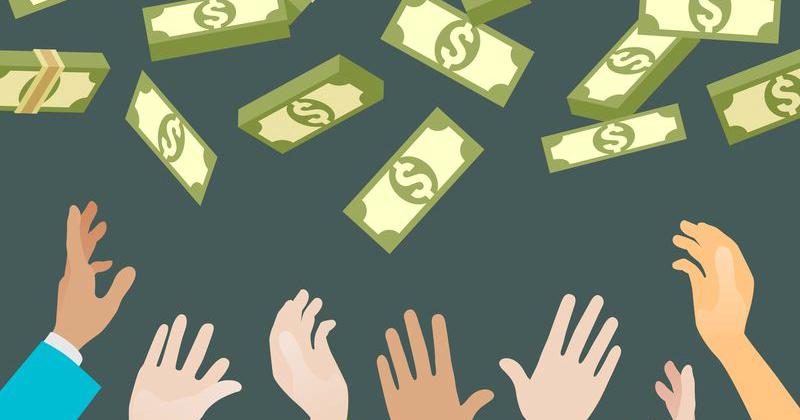Human civilization is constantly evolving and changing. The gradual extinction of professions is now becoming relevant. At first there was an increase in efficiency due to mechanization. But now they are disappearing altogether due to robotics. Therefore, more people have to retrain. But this is far from the only problem. After all, while people will be relearned, they need money for life. It is to solve this problem that it is proposed to introduce unconditional basic income. What it is? Where are you already experimenting with this concept? What is this concept? What are the possible consequences of its introduction should be expected? These questions will be answered in the framework of this article.

What is unconditional income?
Unconditional basic (main) income is a social concept, as well as a payment model created on its basis. It involves the issuance of each member of the company a certain amount of money. There are a fairly large number of points of view on this concept. The position of the organization “Worldwide Basic Income Network” will be taken as a support for the entire article. Why exactly this one? The fact is that the organization is quite seriously engaged in promoting the concept, exploring the possibility and results of its experimental implementation. So she can boast a significant amount of data. This organization believes that unconditional basic income is an important milestone in the development of human society. And he should have the following characteristics:
- Paid in money, not a specific equivalent (for example, a set of food or services). Those who receive basic income must decide for themselves what they will spend the money on.
- Be periodic. That is, payments should be received regularly after a certain period of time. For example, every month.
- Payments should go to individuals, not households or communities.
- Universality. Payments must be paid without testing and establishing compliance with any criteria.
- Unconditioned. Payments should go without the need to work or demonstrate a willingness to find a job.

And what will act as sources of funds for all these payments? They may be different (depending on the decisions made by the state). Taxes are mentioned as examples, which will be obtained upon cancellation of various benefits previously distributed to individuals. There are not very good thoughts (like issuing money).
Why is this concept needed?
With its help, it is supposed to solve several problems:
- Poverty. It is believed that everyone should receive the amount that will be enough to sustain life.
- Unemployment. Automation of production is constantly growing. As a result, fewer people can find work in these areas. Artificial intelligence, robots and new technologies appear and develop. Therefore, in the future, unemployment may increase.
- The problem of choosing an activity. Many people are now forced to focus on certain conditions of the economy, the market and think about providing their activities. That is just to survive. The introduction of basic income allows you to do what a person wants. Due to this, there is an interest in the result, which leads to high efficiency.
- Reduces the costs of organizational aspects of payments. If everyone pays the same amount, then there is no need to check whether they meet certain conditions.

And what in practice?
Many have heard that there was an experiment that provided unconditional basic income in Finland or Switzerland.And they think that this is a matter of the distant future. But is it really so? If you ask an ordinary citizen about whether there is an unconditional basic income in Russia, then he will almost always answer no. But this is to a certain extent a fallacy. Why? And remember the pension - a person may not work, but he always receives money. They are not very large, but still. After all, there are funds. This payout experience can be considered a specific beta. But not everything is as easy as we would like. The most promising area in the future is taxation of robots and the products they create. And already from these funds it will be possible to pay money to citizens. But it’s still far from rampant robots. And with it, the unconditional basic income in the EU countries and in Russia is also distant.
Although certain social experiments are being conducted. But they have their drawbacks. For example, unconditional basic income in Finland was introduced for several thousand people. Seems not bad. But here's the problem - the experiment will last only a few years. And then what? Surely people are asking themselves this question. They cannot fully realize their potential, because they know that the finances provided are given only for a while. After all, there is no way to ensure uninterrupted operation of the system. Recently, with the help of a referendum, they wanted to introduce unconditional basic income in Switzerland, but the inhabitants of this state voted against this idea. After all, its introduction would make it necessary to significantly increase taxes on people. Not robots. Similar cavalry attacks will continue on this subject in the future. And at the same time, an evolutionary translational movement in this direction will be observed.

Will people stop working?
This is the most common concern. Reliably knowing the answer to this question is not possible. But to predict and evaluate a possible reaction is quite within reach. In March 2017, Dalia Research surveyed Europeans from 28 countries about their relationship to basic income. In total, eleven thousand people took part. They were asked the question: "What is the most likely effect on your job choice would have a basic income?" Of all the people, only three percent said they would stop working. While more than a third (37%) said that its presence would have no effect on the work. Another 17% said that the introduction of basic income would allow the family to devote a more significant amount of time. Another 7% would start working as volunteers, the same amount would be engaged in improvement, 5% would change jobs, 4% would become civilian employees. Everything seems to be good. Although as it would be in reality, it’s difficult to speak.
At the same time, it turned out that people are worried about the lack of motivation to work. Speaking about the opinions and reasons against this concept, 52% identified a similar danger. Another 32% are worried that in this case, a flood of migrants will pour into the country who will want to take advantage of the available benefits. But the number of supporters of this concept is growing, in March 2017, among Europeans, they were 68%. Therefore, in our century we can expect unconditional basic income. In which countries will it appear first? It's hard to talk about it. The Swiss could have played such a role, but they refused a referendum. Perhaps the Finns will do it.
About experiments in Canada
Opponents of the concept say that in the current situation it will be very difficult to implement it. And this will require significant resources. But several experiments have already been carried out, some go and there are planned. Very interesting, everything turned out for the Canadians. One of the most entertaining experiments was from 1974 to 1979 in the province of Manitoba. The project itself was called Mincome. It was attended by residents of Dauphin, Winnipeg and some rural settlements. They received guaranteed annual income per family. True, its size depended on their salaries.For every dollar they received, 50 cents was deducted from the allowance. It may seem to some that this motivates to work. But in practice it turned out that everything is much more interesting. What has been achieved?
Recipients were able to overcome the poverty line. They did not stop working and did not quit work. The money received was directed to the education and health of all family members. For four years they were able to increase the number of children who graduated from school. 16-18 year olds could continue to study, rather than drop out of an educational institution to earn money. Fertility among minors has decreased. In addition, the number of accidents, mental illnesses and injuries was reduced.
In 2017, it was decided to continue the research. And a new experiment was launched. It will last three years, and the number of participants will be four thousand people living in the cities of Thunder Bay, Lindsay and Hamilton, located in Ontario. Citizens of Canada from 18 to 64 years of age who performed low-paid jobs, were employed in casual jobs and lived on benefits were selected as participants. Basic income is paid once a year and there is no need to report on expenses. Although the government still plans to monitor where the money will go. The conditions are the same as in Mincome.

Where else?
Similar studies were conducted in the USA, Germany and India. The experiments were funded in a variety of ways - through donations, sponsors, and the government. According to reports received, positive trends were observed: school attendance increased, crime rates fell, economic activity increased. Now an experiment is underway in Finland, studies are planned in the Netherlands and some African countries (as a measure to combat poverty). However, there is a specificity. For example, in the Netherlands they want to take this concept away from politics and use slightly different terminology. For example, studies are called “confidence experiments,” while the basic income for them is the salary of a citizen.
On the expanses of the former USSR, talk about this is conducted on the territory of Ukraine and the Russian Federation. It is planned to introduce unconditional basic income in Kazakhstan. In 2016, Nazarbayev decided to provide training for the transition to a similar concept. Many people doubt it, but time will tell how it will be in practice. Although we should not forget that there are people who are ready to abandon such an attractive concept. The Swiss on July 5, 2016 during the referendum clearly said their "no." Against, 76.9% of those who voted.
The cure for poverty
The results of the experiments are very positive. But they are clearly not enough. So, there were small samples of people and poor and socially vulnerable groups received help. And what will be the result if you start paying money to everyone? It’s hard to predict. Although as a measure of poverty alleviation is very good. But there are a number of problems. One of the most significant - not every social system and economy can afford to use this concept. Not all people accept it. Here it is just right to recall Switzerland. People in it refused an unconditional basic income, since in modern conditions it would lead to an increase in taxes for people. And instead of targeted social benefits to people who need them, everyone would receive the funds.
But here you can give one very interesting example. In 2016, the GiveDirectly non-profit organization paid the sum to six thousand Kenyan residents, which would cover the needs of such basic needs as food, housing, clothes. This project has encountered certain difficulties. It was simply difficult for local residents to believe that someone would just give them money. In one of the districts, 45% of the recipients refused to help at all, because they believed that this was a payment for worshiping the devil.All this shows that not only the economy, but also society should be ready. And here the level of education, social attitudes and mentality have a significant impact.
Is it worth waiting for something like this in the Russian Federation in the coming years?

Will unconditional basic income be introduced in Russia? If you look in retrospect, then something similar was in the days of the Soviet Union. Then it was possible to build a system when there was a certain standard of living, below which it was difficult to fall. Although he was not tall, there were very few poor (if at all they did not exist as exceptions). But now there is a construction of capitalism. A good deposit exists - it is the same pension system. But it is far from full-fledged unconditional basic income. It is necessary to solve a number of problems. The most important is where to get the money? You can use the funds received from the export. But the added value is not very high. And the possible ceiling is very limited. Living on oil and gas can be very easy only in the case of a small population. For example, as in Libya in the early 00's. Or in Saudi Arabia. But in the latter, when reaching the mark of 30 million people, problems in maintaining the existing lifestyle also began to be observed. And now you can observe (albeit minor) shifts - for example, a desire to note a number of benefits, for example, when paying utility bills. Therefore, when introducing this concept in the territory of the Russian Federation, it is necessary to resolve the issue with the source of funds. The most optimal option is generalized labor robotization, the development of scientific and labor-intensive sectors of the economy, the creation of closed production cycles, which will ensure a decent standard of living for all citizens.
A bit of philosophy
But can it be implemented in the current conditions? Criticizing oneself is unpleasant and difficult to perceive. Therefore, let's choose a country similar to the Russian Federation - Ukraine. Can basic income dramatically change the situation? Now hardly. After all, this requires income. After a long tight control by the state in the form of the Soviet Union, it is quite difficult for many to stimulate their development and growth on their own. It is rather difficult to talk about such moments as comfort, safety and well-being. More relevant is the search for success, the creation of conditions that will be most suitable. First you need to build yourself, to create a confident, organized, intelligent, critical-thinking person who can work to achieve the result with full dedication. After all, only after this you can have the opportunity to search, create, research, devote yourself to science and / or improvement in many aspects of life. You can consider a simple example: how many modern Ukrainian artists are known? How much do they earn? Unconditional basic income can significantly help them, and in the long run - to the whole art. People will be able to develop talents, and before that there were no resources and time. But where to get funds for security?
Conclusion

Social payments in the modern world to some extent contribute to the depreciation of money. After all, if everyone has them, then their value is lost. Perhaps someday money will not be needed. And the unconditional basic income will be a virtual indicator of what a person can afford. But until those times it is still necessary to survive.
